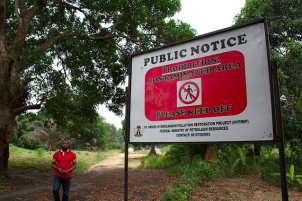
By Leah Temper.
Oil permeates our existence. From water bottles, plastics, fuels and paints to fertilizers, fabrics and solvents. Yet despite its ubiquity, the reality of the infrastructure behind oil extraction – the pipelines, terminals, offshore rigs, the tankers that ply the oceans — the process of how oil arrives into our lives and our tanks, remains completely obscured to the average citizen. At the gas pump, one cannot choose between Bonny Light Nigerian Crude or ‘Ethical’ Canadian Tar Sands oil.
The dirty business of extracting oil is perhaps best revealed in all its gory in the Niger Delta. Here, one at once understands why Venezuelan Foreign Minister Juan Pablo Pérez Alfonso, a founder of OPEC, compared oil to “swimming in the devil’s excrement”. Never mind that the oil boom made his country fantastically rich.
The Niger Delta may hold the dubious distinction of being the most contaminated place on the planet. Covering an area roughly the size of Scotland and home to 45 million people, the Delta used to be a picturesque wetland. Its marshy sediment-rich soils are home to mangrove swamps, lowland rainforests and barrier islands. Together they once formed some of the planet’s richest biodiversity.
A BP disaster every year
The discovery of oil there first took place in 1956 in Olibiri village. Production by Shell began two years later. Yet the despoliation of the delta and oppression of its people by Western companies has a much longer history, beginning with the kidnapping and export of the first 235 men and women sold as slaves by Portuguese adventurer Lancarote de Freitas in 1444. As the Industrial revolution began, British traders turned their focus from slaves to palm oil, needed to grease the wheels of industry. Throughout the delta, communities continued with their traditional agriculture of rice, cassava, yams and sugar. They fished periwinkles, crabs, other seafood and fish from the creeks. Yet over the past six decades, their livelihoods have been devastated by oil pollution. It is calculated that as many barrels spill every year into the unique riverine ecosystem from the vast network of rusting pipes and storage tanks, corroding pipelines, semi-derelict pumping stations and old wellheads as was lost in the BP Deepwater Horizon disaster in the Gulf of Mexico.
Shell, as the main operator in the region, is the biggest offender. The company is targeted with court cases from The Hague to London to the U.S. that will have important implications for corporate accountability around the globe.
The U.S. remains the largest importer of Nigeria’s crude oil, accounting for 40% of the country’s total oil exports and for about 10% of overall U.S. oil imports. Other big importers include European countries, including the Netherlands, Italy and Spain. Nigeria is the 6th largest oil exporter in the world, yet despite its oil wealth, or rather because of it, it is also one of the most unequal countries on earth. Nigeria is also a large gas exporter. Websites justifying the high cost of living for expats explain how Nigeria’s rich are not millionaires, but billionaires. The World Bank has estimated that as a result of corruption, 80% of energy revenues benefit only 1% of the population. The income distribution for the poorest (bottom 10%) is 1.6% while it is 40.8% for the richest (top 10%).
Illegal Flaring
The Niger Delta also happens to be one of the most densely populated regions on earth. The life expectancy in Nigeria now hovers above 50 years, nearly 20 years below the world average. But in the oilfields, it is 41 years. A United Nations Environment Program report on the Ogoni region found water with 900 times the safe level of carcinogens. Local complains of health problems include respiratory diseases and skin lesions, drinking wells poisoned with benzene. Aside from the spills, the 257 gas flaring points that dot the landscape burn night and day. The “superfluous” extraction gas that comes up with the oil, spewing toxic gases, methane and millions of metric tons of C02 emissions per year into the atmosphere. While acid-rain corrodes the tin roofs covering their shacks and means, even the rainwater is too toxic to drink.
Yet amidst the most oil-soaked place on the planet, crushing energy-poverty means that more than 60 percent of the nation’s population is not connected to the national grid while the remaining population can only boast of erratic power supply, punctuated by daily blackouts, even in the capital Abuja. Most private business and rich residences use generators but diesel and even kerosene are hard to come by. Nigeria has not enough local refining capacity and must import these fuels.
This explosive superimposition of extreme wealth and poverty means that communities in the Delta have been resisting the ecological war the oil companies have been waging against them for over 20 years. Tactics have ranged from peaceful resistance such as the MOSOP (Movement for the Survival of the Ogoni people) led by Ken Saro-Wiwa to guerrilla military uprisings such as the MEND movement. Nigeria has seen women who have brandished their nakedness as a weapon of resistance long before topless Ukrainian activists FEMEN entered the news.
Beginning with the Ogoni Bill of Rights, submitted in October 1990 and followed by the Kaiama declaration by the Ijaw youth movement in 1998, the demands of the Niger Delta communities laid out in these declarations included resource control and self determination, the cessation of activities of the oil companies and remediation of the impacts. Yet the government with the complicity and sometimes under the guidance of the oil companies responded to the peaceful uprising with violence and brutal crackdown, engendering a cycle of violence whereby communities turned to armed resistance.
Yet until today such popular demands for justice have not been met and social and environmental abuses continue to abound. The security situation has been reined in since 2009, when the government enacted an amnesty program that saw several thousand Delta fighters exchange weapons for cash and in some cases for lucrative jobs as security operatives on the payroll of the oil companies.
This was followed by the election of President Goodluck Jonathan, an Ijaw native of the Bayelsa state in the Niger Delta, in 2011. Yet hopes that having “their man” in power would signal a shift in fortunes for the Delta have largely been dashed. When we visited Nigeria in March 2013 the media was up in arms after the President had issued a presidential pardon for Diepreye Alamieyeseigha, a former governor of Bayelsa who jumped bail after being indicted in London for money laundering oil profits into his personal bank account.
We had been invited to the Niger Delta on a mission with EJOLT (Environmental Justice Organizations, Liabilities and Trade), a European funded project that brings together scientists and activists to document ecological conflicts and to support communities in their struggle for justice and demand true accountability for corporations engaging in “ecocide”. The other reason for the visit was the 20th anniversary celebration of Nigeria’s leading environmental justice organization (and a member of the EJOLT project): Environmental Rights Action (ERA). ERA has been mobilizing for 20 years to protect the environment in Nigeria. Their achievements are legion, especially in the light of the persecution activists continue to face and the lack of laws and regulation. They are also founding members of Oilwatch, a Southern network of resistance to the fossil fuel economy that has spearheaded the call to “Leave Oil in the Soil”.
The celebration was bittersweet. Companies such as Shell continue to reap some of the highest profits of any corporation in the world in 2012 (some $28.6bn or about 2m an hour), at the cost of communities in the Niger Delta who have their meager livelihoods trodden over and destroyed without any recourse to justice. When we arrived we traveled from Port Harcourt to Ogoni-land and to other delta communities to meet with the defendants of the trials and other communities who had been waging battles against Shell in courts.
A long way for justice
The path to litigation in Nigeria is long and painful. Claims are often dust-binned for years before they mysteriously ‘disappear’, and the corporate- government embrace is designed to let the polluter off the hook. Yet a shifting legal environment has recently enabled activists in the delta to turn to courts in foreign countries in a bid to have their cases heard. Ongoing civil cases in London, The Hague and in the US over Shell’s liability are being closely watched by both environmental and human rights activists and corporations around the world. How they play out will not only have important ramifications for Shell’s future liability for the ecological disaster in the delta, but more broadly for whether companies and their subsidiaries can continue to enjoy impunity by hiding behind complex legal structures.
Principles of justice hold that companies should maintain the same standards of operation in any country they operate in. While Shell denies claims of double standards, a trip to the delta renders such claims beyond laughable.
Jurisdiction and capital flows: the cases in the Hague
Goi is now a ghost-town. The community has scattered, joining the ranks of environmental refugees that now number perhaps some 30 million worldwide. The Dooh family have been displaced, yet they are here working on their land, even though they know that the yields will be small and the fruit will be poisoned.
“They only came to put a sign saying this land is contaminated, and to keep off.” Says Veronika Kobani, age 58 and one of the displaced. “They didn’t clean up anything. Nobody knows the levels of contamination and pollution in our communities.”
Frustrated with the Nigerian legal system, the Doohs, together with other impacted farmers and fishermen, decided to take their civil lawsuit to The Hague, where Shell holds its head offices. They were supported by ERA and its lawyers, as well as by MilieuDefensie, the Dutch Environmental Defense Organization/Friends of the Earth Netherlands.
They asked that Shell should be held liable for the oil spill from her pipeline, that the company maintain the pipelines to guarantee against future spills, clean up the pollution and pay adequate compensation for the damages suffered. In a landmark ruling, the Dutch judiciary in 2009 declared itself competent to try the case despite protests from Shell that its Nigerian subsidiary was solely legally responsible for any damage.
However, the judgement delivered on January 30, 2013, offered mixed results. The court affirmed that oil spills were not caused by defective maintenance by Shell, but by sabotage and that pursuant to applicable Nigerian law, the company is not liable for spills caused by sabotage. The court thus dismissed the claims in four out of the five lawsuits.
Rust or sabotage?
Sabotage does occur in the delta. “Bunkered” oil is siphoned off and sometimes refined and sold in makeshift shops or in the many gas stations dotting the highway. What is also true is that Shell’s aging facilities and corroding network of pipes, degraded by the acid rain and equatorial heat have been 20 years without maintenance. The state of disrepair was attested to in the recent UNEP report on Ogoni territory that affirms that even Shell’s own procedures and standards are not applied in the region. According to activists, Shell uses sabotage as a mystification device and an excuse to evade responsibility for the state of its facilities. As one activist says, even if sabotage contributes to the spills, “You can’t leave 7,000 kilometers of pipeline unguarded” in a poor country like Nigeria.
Furthermore, the Joint Investigation Team (JIT) should involve the company, the regulatory agency and the community who are supposed to visit the site and determine the facts for the spill. Yet the reality is that the process is controlled by the company, as regulatory oversight is ineffective and communities do not have the technical capacity to measure spill volumes and the cause of breaches. Activists from ERA charge that this has allowed Shell to consistently underestimate the spills caused by operational failures. Furthermore, they claim that in the Goi case, no satisfactory JIT was available.
Piercing the corporate veil
The other disappointing precedent in the case was that the court also upheld the claim that Dutch Shell could not be liable for the actions of its subsidiary company, Shell Nigeria. Through its subsidiary Shell Nigeria, Shell is a 55% investor in the Niger National Petroleum Company. The reasoning behind this decision was that according to Nigerian law, the parent company is not held responsible for the actions of its subsidiary. How convenient for the raft of international companies in operation there, which also include Agip, Chevron and Total Elf.
The plaintiffs also plan to appeal due to the court’s unwillingness to force Shell to open internal communications for inspection. The court’s lack of interest in even peeking under the corporate veil limited the implications of the case and according to some observers, revealed the economic protectionism of the court in the midst of a European financial crisis. This was expressed through a reluctance to uphold companies to human and environmental standards that would be good enough for their own citizens.
A Small Victory
The court however offered respite in one of the cases. The court held that in the two oil spills near the village Ikot Ada Udo, “sabotage was committed in a very simple way in 2006 and 2007 by opening the over-ground valves with a monkey wrench of a deserted oil well by Shell Nigeria. The court observed that Shell Nigeria could and should have prevented this sabotage in an easy way by installing the concrete plug before 2006, which it did not do until 2010.”
At a town meeting attended by the regional chiefs, Mr. Akpan presented his victory, framing it as a community victory. He then takes us out to visit what they call the Christmas tree. The well in question had been opened by Shell in 1958 and was found unviable, but Shell never properly plugged it. The company has been ordered to pay damages and compensation still to be determined. Mr. Akpan, sweating under the sweltering heat, points out the land where his fishponds and his farm once prospered, employing several hundred local workers. He says that with God’s grace he will hopefully finally be able to rebuild what he lost. Yet so far he stands as the only person who has been handed justice – slim pickings amongst the hundreds of thousands affected by oil pollution in the region.
Despite this, ERA still considers the ruling a watershed, according to former ERA director Nnimmo Bassey. “I think the fact that we succeeded in at least one of the cases is a major milestone because now Shell and other transnational corporations can be sure that they cannot pollute the environment anywhere in the world and run back and enjoy their profits back home.” Friends of the Earth Netherlands plan to appeal the findings, and say that Akpan’s victory can open the case to other impacted litigants in the community.
The Bodo Case
After Goi, we drove a few km down the road to Bodo. This is where most of the refugees from Goi now live. But if they were attempting to escape the scourge of oil they didn’t go far enough. The spill here makes the one at Goi seem like so much spilled milk.
The Bodo community is comprised of 35 villages and fishing communities that covers 9,230 hectares with a population of about 49,000 people. Oil has not been exploited here for over 20 years since the Ogoni mobilization began in 1993, but pipelines still run under their land, bringing Shell crude to the Bonny terminal. Around the 28th August 2008, a rupture in the pipeline emptied from 2,000 to 3,900 barrels per day into the creek that they have fished and gathered seafood in for generations. This geyser was not plugged until November 7th. The second spill a month later in December 2008 was not plugged until February 2009.
We were greeted by a delegation of the Bodo Council of Traditional Rulers. They explained how the spill has devastated their lives. After the talk we walked through what at first glance seems a normal village. Kids running along the paths, a woman drying fish over a fire. Yet when you look closer you become aware that she is defrosting a block of frozen fish, in a region that held the richest aquatic biodiversity in Africa. Where periwinkles, crabs and other shellfish once abounded, the local community is now forced to purchase expensive imported fish from the North. As you walk through a thin row of scraggly trees, you come through what was once the Bodo creek, now a black lake where nothing can survive.
In contrast to the Goi and Icot Ado cases, Shell has actually accepted responsibility for the breaches that occurred there in 2008. What is in dispute is how much crude flowed, as compensation is often heavily correlated with the size of the spill. Amnesty International claims that while Shell’s official investigation report claims only 1,640 barrels of oil were spilt in total, the actual volume of oil was at least 60 times bigger. Based on a independent assessment they arrive at between 103,000 barrels and 311,000 barrels. According to Amnesty, the lack of any credible record of the cause of spills, the volumes spilt and even the start date of ruptures give the lie to Shell’s claims to investors that up to 85% of oil spilt is by sabotage.
Whether the British High Court case will take the company’s claims at its word, as was done in The Hague, remains to be seen. This case is the first time Shell has faced claims in the UK from the developing world for environmental damage.
Kiobel v. Shell
Esther Kiobel’s husband, Barinem Kiobel, was arrested in 1994 along with Nobel Peace Prize nominee Ken Saro-Wiwa and others from the Movement for the Liberation of the Ogoni People (MOSOP). They were principal leaders in the protests against Shell and the Nigerian state over pollution of Ogoni. Known as the Ogoni Nine, they were tortured and executed after a sham military trial.
With no recourse in Nigeria, Esther, who had received asylum in the United States, filed a lawsuit in federal court in New York accusing Shell and its Nigerian subsidiary not only of conspiring with and financing the brutal campaign against the Ogoni and MOSOP but also of actually calling in the military to suppress specific protests, and of providing the military with food, transport and compensation. The suit alleged that Shell was thus complicit in the commission of torture, extrajudicial killing and other violations, resulting in crimes against humanity. She relied on a U.S. law called the Alien Tort Statute (ATCA) dating from 1789 and designed originally to protect against pirates on the high seas.
The ATCA bill is unique in that in enables third parties to bring corporations to trial in the United States for torts with only a tenuous connection with the country. The statute grants “the district courts original jurisdiction of a civil action by an alien in tort only, committed in violation of the law of nations or a treaty of the United States.” While it lay dormant for almost 200 years, over the past 30 years it has become an achilles heel for activists fighting corporate injustice, with past cases being brought against Unocal, Shell, Coca-Cola, Talisman and many others.
Yet despite the fact that ATCA has been used to bring some 100 corporations to trial in the U.S., because of the Kiobel v. Shell case, the court is now considering a pair of jurisdictional questions about the Alien Tort Statute that threatens to rip the guts out of it. The first is whether it applies to corporations, and secondly, whether it applies to human rights abuses overseas.
ATCA in the dock
While the Kiobel case was under way, Shell won a ruling in September 2010 from the influential 2nd U.S. Circuit Court of Appeals that said Shell could not be held liable under the statute because it was a corporation. This came as a major shock, and Kiobel’s lawyers responded by petitioning the Supreme Court, which agreed in October 2011 to take the case on the narrow question of whether corporations could be held liable under the statute.
Here the plot thickens, as the actions of two conservative activist lawyers became significant. John Bellinger, a former legal adviser in the Bush administration State Department had been collecting complaints from foreign governments, including Canada, Australia and Britain, who had protested when cases against their companies were brought under ATCA. He teamed up with Clement, a conservative “wonderkid” lawyer who has worked on some of the most high profile cases in the country, including defending Arizona’s immigration law and a federal law that defines marriage as a union between a man and a woman. Together, in February of 2012 they filed a brief on behalf of BP Plc, Caterpillar Inc, ConocoPhillips, General Electric Co, Honeywell International Inc and IBM. Their argument was that the Alien Tort Statute does not cover events that took place in foreign countries, nor does it apply to those who help others commit abuses, only those who commit abuses themselves.
When the Supreme Court convened for the Kiobel case, the plaintiffs were stunned when the court asked the parties to come back and argue an entirely new question: whether, and under what circumstances, the Alien Tort Statute applied to events on foreign soil.
The court’s interest, when enquiring about whether local remedies had been exhausted, did not ask about Nigeria (it was assumed the justice system was deficient there), but rather if the UK and Netherlands, home countries to the corporations, were fair judicial systems. Thus the argument seems to be that if countries such as the U.K., and the Netherlands are accepting jurisdiction over their domestic companies, whether the US still needs a role policing for international human rights or whether this amounts to judicial imperialism that will lead to possible “friction” in foreign relations. As in the Dutch case, the main concern seems to be potential retaliatory actions for US companies should they be similarly held to account in other jurisdictions, harming US interests.
The court’s decision to consider this wider question of extra-territorial jurisdiction could have a major impact. As of August this year, there were 36 claims against corporations under ATCA. If the court had ruled that ATCA does not apply to corporations, 20 of those cases would have to change to name individual corporate officers as defendants. While this would be complicated, it would not dismiss the cases.
If however, the court rules that the statute does not apply to events on foreign soil, 29 of the current cases would likely be dismissed, wiping out lawsuits pending against companies such as Exxon Mobil Corp, Rio Tinto Plc and Nestle, which are accused by private plaintiffs of helping governments violate human rights in Indonesia, Papua New Guinea and Ivory Coast, respectively.
Three cases, three courts. How they are resolved could well define the future legal architecture for holding corporations accountable for environmental and social crimes. As it currently stands, there is no functioning system of corporate accountability and liability for transnational corporations. Even when cases are won, as with the Chevron Texaco case in Ecuador, it proves extremely difficult if not impossible to collect the indemnities for damages and remediation.
Towards an International Court for environmental crimes?
Activists are understandably shaken by the possibility that one of the last options for prosecuting these crimes may soon be closed, but the question, ‘Why in the United States?’ is a good one.
The short answer is that the United States is an appropriate venue for such crimes because most of the largest corporations in the world have a presence of some form there. Of the 500 largest multinationals, a recent study characterizes 186 as having a United States domicile, 126 with homes in the European Union, and 108 with headquarters in Japan. Yet nearly all 500 have a presence in the United States sufficient to support territorial jurisdiction over them. For example, The Wiwa v. Royal Dutch Shell case was brought under ATCA because Royal Dutch maintained a small shareholder relations office in New York.
Yet the larger questions are — should not there be an international court to deal with crimes against nature? And is civil liability enough or should these cases be prosecuted criminally?
Environmental problems are essentially international by nature. We all share the environment and we are all part of the global eco-system. The gas that is flared in Nigeria is a crime against those in the Delta that breathe in the toxic fumes, but it is also a crime against all who share the atmosphere, who suffer the impacts of climate change, and all those who suffer from lack of access to energy.
Calls to institute international legal mechanisms to punish wanton destruction of the environment are not new, but they have been building in force in recent years. In March 2010, international barrister Polly Higgins proposed to the United Nations that ecocide be considered the 5th crime against peace under the Rome Statute. The International Criminal Court is currently limited to the prosecution of individuals of four crimes: genocide, crimes against humanity, war crimes and the crime of aggression. She defines “ecocide” as “the extensive damage to, destruction of or loss of ecosystem(s) of a given territory, whether by human agency or by other causes, to such an extent that peaceful enjoyment by the inhabitants of that territory has been or will be severely diminished.” A European Citizen Initiative is now trying to gather more than a million signatures to get it on the European agenda.
One month after her proposal to the UN, the Universal Declaration of the Rights of Mother Earth was proclaimed on April 22, 2010 (Mother Earth Day) by the more than 32,000 participants in the People’s World Conference on Climate Change and the Rights of Mother Earth held in Cochabamba, Bolivia. The Declaration recognises that Earth is an indivisible, living community of interrelated and interdependent beings with inherent rights, and defines fundamental human responsibilities in relation to other beings and to the community as a whole. The use of the term “Mother Earth” emphasises that humans should relate to the being that gives them life in a deeply respectful manner and not as an inanimate “resource” to be managed, or as a provider of “environmental services” that can be properly priced and internalized.
The Rights of Nature have already been enshrined in the constitutions of Bolivia and Ecuador. In the latter country, a court case against BP for the Gulf of Mexico Oil spill gives an idea of what this new legal doctrine could look like. The 2008 constitution has a clause (art. 71) allowing citizens to take action to defend the rights of Mother Earth anywhere on the planet. On the 26th of Nov. 2010, Nnimmo Bassey, along with Vandana Shiva and activists form Peru, Mexico, and Ecuador brought a case against BP in the Ecuadorian constitutional courts for damaging and polluting Mother Earth, and the case has been accepted. Perhaps the most interesting element of the case is that the plaintiffs have not demanded financial compensation. But rather they ask that BP should reveal exactly how much crude oil they spilled into the gulf of Mexico and to commit to leave the same volume of oil untapped, to leave it in the soil, as a compensation to Mother Earth for what they did. This demand highlights that money cannot repair the damage done, and that a key precondition of justice is the promise to cease the damaging activities.
This brings us to the 2nd question that the US high court is grappling with: “Should ATCA allow the prosecution of corporations or of individuals?” Corporations are legal persons (admittedly as Joel Bakan has pointed out, with some pathological traits). Yet despite this a corporation remains an abstraction, it has no body or mind of its own. While corporations can be made to pay substantial sums of money – they cannot go to jail, they cannot be ”reformed”. The legal costs and the fines are already factored into the costs of “Business as Usual”, and when possible they are passed onto the consumer as an externality. For this reason, many argue that civil liability is not a sufficient deterrent and that what is needed is criminal liability for the directing mind and will behind the corporation — namely the CEOs.
Antonio Gustavo Gómez is the General Prosecutor in Argentina’s Federal Court of Appeal for the province of Tucumán. He specializes in the investigation of environmental crimes. In 2008, he successfully brought criminal charges against Julian Rooney. Julian is the Vice President of Bajo La Alumbrera, a copper gold-mine jointly owned at the time by Swiss giant Xstrata Copper, Vancouver-based GoldCorp and Toronto’s Yamana Gold. The charge was for discharging liquids containing heavy metals, cyanide and mercury into a canal used by farmers and livestock.
Gustavo Gomez is a firm believer that penal responsibility is the only way to deal with environmental crime. He argues for the establishment of a separate international environmental crimes court that would be based on the International Criminal Court. Higgins’ vision for “eco-cide” prosecution also entails the imprisonment of the CEO of the company, as well as the need for restorative justice through actively repairing the damage they had caused and not just paying a fine and leaving.
Such demands may seem unrealistic in a world where countries cannot even agree to act jointly to avert catastrophic climate change, but the debate itself aims to underline the absurdity of the current system where the “polluter rarely pays”. For true deterrence and a change in corporate practices, penalties must go beyond civil liability. The current obstacles to guaranteeing the right to a healthy environment may seem insurmountable, but we need only think that the Universal Declaration of Human Rights, adopted on the 10th of December 1948, is only 65 years old this year. Its genesis was the result of the experience of the Second World War and the atrocities witnessed there.
Perhaps all one needs is a trip to the Niger Delta to understand why Nnimmo Bassey and others compare what is happening there to a genocide, “Everyone in America or Europe enjoying cheap oil or thinking that oil is expensive, needs to come down to Nigeria and see the situation of the communities in the oilfields who have been subsidizing with their blood and lives and livelihoods the production of petroleum and the massive criminal profits of the oil corporations. They should think that every pint of oil may well be equated to a pint of blood in the Niger Delta,” he says.
Meanwhile, Delta communities continue to grasp at any meager shred of justice available to them. As Mrs. Kobani from Goi says, “We have not got justice but at least our case has been heard.”

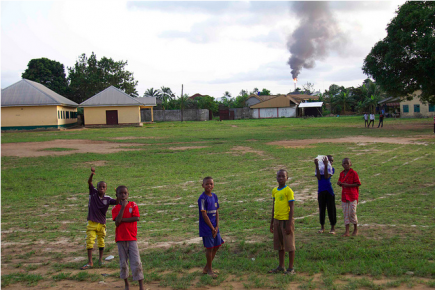
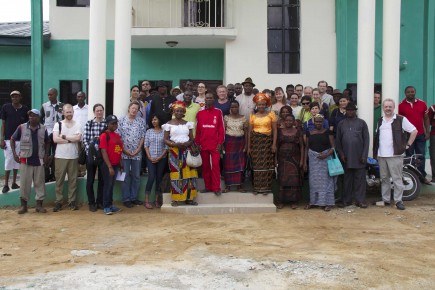
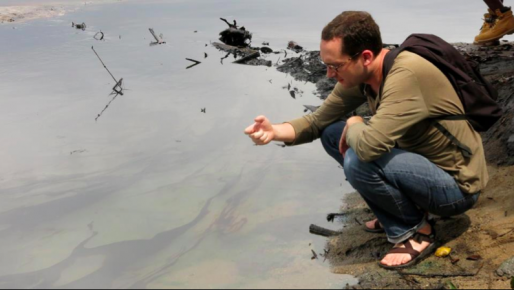
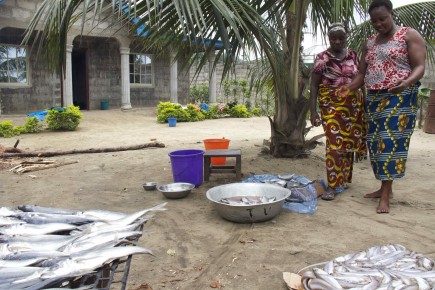
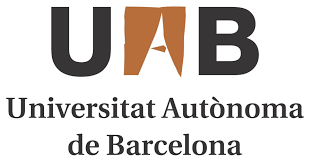


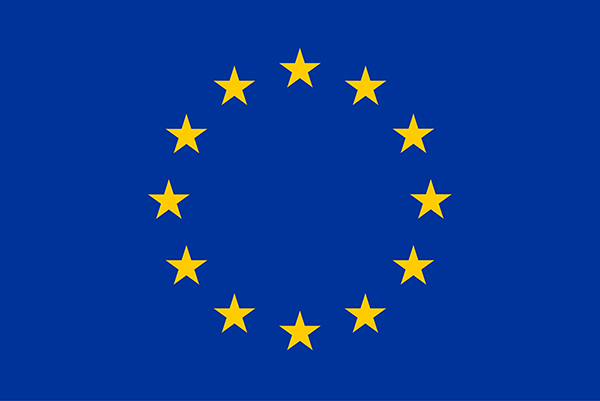
Pingback: Acaparamiento de tierras para extracción de petróleo: la cruda realidad del Delta del Níger | WRM
Pingback: OIL – Land grab for oil: The crude reality of oil drilling in the Niger Delta | WRM
Pingback: A context Piece | Earth School